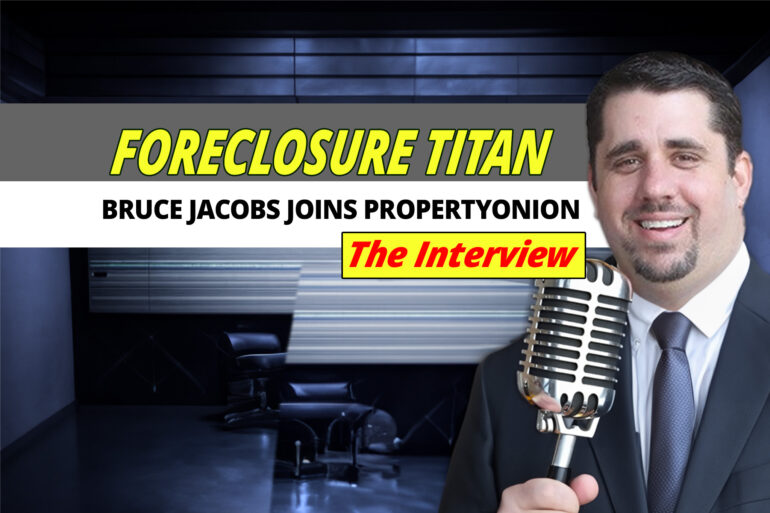Interview with Bruce Jacobs: PropertyOnion.com’s New Director of Business Development
Bruce Jacobs recently joined the PropertyOnion.com team as Director of Business Development. We sat down with him to discuss his background, legal career, achievements, new role, and more.
“There were a lot of people having real problems. And I knew I could help them.”
Educational Background and Early Career
Jacobs graduated from the State University of New York at Albany with a BA degree in history. He then attended Fordham University School of Law and passed the New York, New Jersey, and Florida Bars in 1997.
As his first foray into law, Jacobs became a prosecutor at the Dade County State Attorney’s Office in Miami. From there, he started working cases for commercial clients — cruise lines, investors, and real estate companies — while overseeing foreclosures for BankUnited.
In 2006, Jacobs started his own law firm. Then during the 2008 housing crash, he knew he wanted to help distressed homeowners in foreclosure cases.
“There were a lot of people having real problems,” Jacobs told me. “And I knew I could help them because I was somebody who understood the foreclosure process and the subrogation and how to fight cases, and it became a passion for me.”
In 2010, Jacobs started attending seminars hosted by North Carolina attorney Max Gardner to deepen his knowledge of bankruptcy and foreclosure defense, which allowed him and his associates to develop his foreclosure defense practice.
It was during this time that Jacobs began recognizing systemic fraud across the U.S. mortgage industry, such as the 2010 robo-signing scandal, which exposed banks for having mortgage documents signed without proper review or verification.
“I know that if you don’t pay your mortgage, you’re supposed to lose your home,” Jacobs said. “But to me, there was just so much that I knew was not being done correctly.”
Diving Into Foreclosure Defense
One of the first forms of foreclosure fraud Jacobs discovered was Bank of America’s home loans — after they acquired Countrywide Financial in 2008 — processing promissory notes without the proper endorsement and then trying to cover it up with forged endorsements.
In a case against Bank of America, Jacobs received emails from a vendor with reports showing that it had been ordered by Bank of America to destroy nearly 2 billion foreclosure records.
“All of a sudden, they started appearing with these endorsements,” Jacobs said. “And the question was, well, how are you putting a Countrywide endorsement on this Countrywide note, and Countrywide has been out of business for four years already?”
This led Jacobs on a journey to expose Bank of America and other lenders.
When Jacobs got as far as the state court system allowed him to go, he went into the federal courts. Funded by the federal government, he filed False Claims Act cases against banks, claiming that they were defrauding the government by making false foreclosure claims in order to get Federal Housing Administration (FHA) mortgage insurance benefits.
In a case against Bank of America, Jacobs received emails from a vendor with reports showing that it had been ordered by Bank of America to destroy nearly 2 billion foreclosure records.
“The more I exposed that they were using false evidence, it opened up other doors,” Jacobs said. “Trial judges were the ones who were letting me do all the work.”
Another systemic fraud that Jacobs discovered involved tax evasion. Typically, when mortgages are modified, banks add whatever is owed to the principal balance of the mortgage, which triggers a tax obligation called a Documentary Stamp Tax. But according to Jacobs, many banks tried to get around this. “I basically got the banks to admit that they had a practice basically of not paying the taxes,” he said.
During trials, Jacobs also ran into banks submitting inaccurate records as evidence. Third-party loan servicers would claim to have checked a bank’s records for accuracy, allowing them to be admitted as evidence, when in fact, the servicers were just making sure they had copied the records accurately.
“It was all a lie. They never checked anything,” Jacobs said. “Ultimately, all the servicers are doing the same thing because it’s a systemic problem.”
Notable Cases and Achievements
For his prosecutions against Bank of America, JP Morgan Chase, and Bank of New York Mellon, Jacobs received national media attention from the Miami Herald, Channel 4, Channel 7, CBS, and other outlets.
The case is “either going to be something that will bring change, or it will show that we have a problem in our court system,” Jacobs said.
In one case, Jacobs represented three separate victims of foreclosure fraud in Miami — Ana Lazara Rodriguez, Julie Nicolas, and Maria Williams-James — who joined five plaintiffs in Hawaii in a national Class Action RICO lawsuit against Bank of America and Bank of New York Mellon that is still ongoing.
Rodriguez is a former political prisoner in Cuba who spent 19 years in prison for protesting the injustices of Fidel Castro. Julie Nicolas is a Haitian single mother. Maria Williams-James is an elderly Black widow who was a schoolteacher for 37 years. All three women faced or currently face eviction due to what Jacobs says were fraudulent foreclosures.
The case is “either going to be something that will bring change, or it will show that we have a problem in our court system,” Jacobs said.
Outside of foreclosure law, Jacobs also helped secure Florida’s highest Negligent Security Jury Verdict for 2018. The case involved a strip club shooting, in which party promoter Christopher Nealy was shot three times, resulting in permanent disabilities. Jacobs and lawyer Reginald Mathis successfully convinced a jury that the club had been negligent in its security efforts and won their client a $8.7 million settlement.
“Mathis and I are really, really good trial lawyers. You give us the right facts and the right jury, and we can make miracles happen,” Jacobs said.
Working Toward More Affordable Housing in Florida
Jacobs has also been a strong advocate for creating more affordable housing. In 2019, he worked with Miami Mayor Francis Suarez and Commissioner Ken Russell to approve Resolution 6021, which would create a Foreclosure Sanctions Affordable Housing Trust Fund.
The idea was to use money from sanctions and penalties awarded to Jacobs’s firm in foreclosure fraud cases to pay for affordable housing in Miami (with Jacobs’s firm keeping a reduced contingency fee). However, the idea was never funded, and Jacobs was hit with an ethics charge for illegal lobbying.
Florida Supreme Court Decision to Suspend Jacobs’s Law License
“Lawyers testified it was shocking the lack of due process and swore judges got mad when you raised fraud as a defense to foreclosures.”
Amid the RICO lawsuit against Bank of America and Bank of New York Mellon, the Florida Supreme Court suspended Jacobs from practicing law.
The court wrote a lengthy opinion citing three separate cases, in which Jacobs “impugned the qualifications or integrity of members of the judiciary” and “crossed a line into name-calling.” It further found that “Jacobs did not provide an objectively reasonable factual basis for making any of his statements impugning the integrity of the judiciary.”
Jacobs disagrees. Although he admitted to impugning the integrity of the court by saying judges were ignoring fraud on the court, he believes his accusations were justified. “The bar trial record shows five judges and four foreclosure defense lawyers testified on my behalf,” he said. “Lawyers testified it was shocking the lack of due process and swore judges got mad when you raised fraud as a defense to foreclosures.”
Furthermore, the suspension order acknowledges, “Witnesses testified that some courts had been receptive to Jacobs’ unclean hands defense while other courts had rejected it. These witnesses essentially testified that there was legal support for Jacobs’ unclean hands defense, and they opined that Jacobs’ arguments were made in good faith.”
At first, Jacobs considered fighting the suspension decision, firmly believing that speaking out against legitimate problems in the court system is not only his First Amendment right but his duty as a lawyer.
“I have steadfastly argued that this bar prosecution is retaliation for my free speech,” Jacobs told me. “I should have been allowed to expose legitimate problems that deprived homeowners of their constitutional rights. U.S. Supreme Court law says speech about my cases deserved the highest rung of First Amendment constitutional protections.”
Still, Jacobs ultimately decided to let the decision be. “I got to a point where I was ready to go have this whole fight in federal court,” Jacobs said. “And then, one of my friends who I’ve known for years and someone I respect finally got me to realize it’s time to put the rock down. You have been doing this for so long.”
At the end of the day, the suspension gave Jacobs an opportunity to reflect, spend more time with his family, and consider where his journey would take him next. He referred most of his clients to a trusted lawyer, “who was willing to have a fight still” and then officially closed his law firm on July 8th.
Beyond the Courtroom
Moving forward, Jacobs plans to focus on being a speaker, mentor, and teacher. Whether it’s teaching foreclosure defense strategies to other lawyers or teaching Citizenship in the Nation to Boy Scouts, “I’ve been teaching for years,” Jacobs said.
All four of Jacobs’s children are in the Boy Scouts of America program, and over the last ten years, he’s been serving as a scout leader. Right now, Jacobs is the Scoutmaster of his daughter’s troop, Troop 719, one of the first troops for girls in scouting.
Another thing that Jacobs has done for a long time is invest in distressed real estate. “I was one of the guys ten years ago who started investing in foreclosure auctions on second liens and combining them with first liens and doing strategies like that,” he said.
So, when Tony Stern approached Jacobs about joining PropertyOnion.com, he thought it made perfect sense. “I have a lot of knowledge that I like to share,” Jacobs said. “And as the saying goes, those that can’t do, teach.”
Ultimately, the goal is to build a real estate community where people “learn together and work together” and “become a force in real estate investing.”
New Career Path and Role at PropertyOnion.com
As Director of Business Development, Jacobs’s first order of business is to expand the course offerings at PropertyOnion.com Academy.
“I started to put together a strategy of building the Academy into something that people can use to really learn how to make money in real estate besides just going to the auction and buying a foreclosure.”
Jacobs told me that he’s working on new Academy courses that teach advanced real estate investing strategies involving probate properties, tax sale overages (surpluses), and more.
“There are all kinds of strategies that more sophisticated investors use to take advantage of situations,” Jacobs said. “And that is the goal with all of this — to basically take people who are interested in investing in real estate and turn them into real estate investors.”
Ultimately, the goal is to build a real estate community where people “learn together and work together” and “become a force in real estate investing,” Jacobs told me. Needless to say, we’re excited to have him on the PropertyOnion.com team and look forward to what the future holds!








